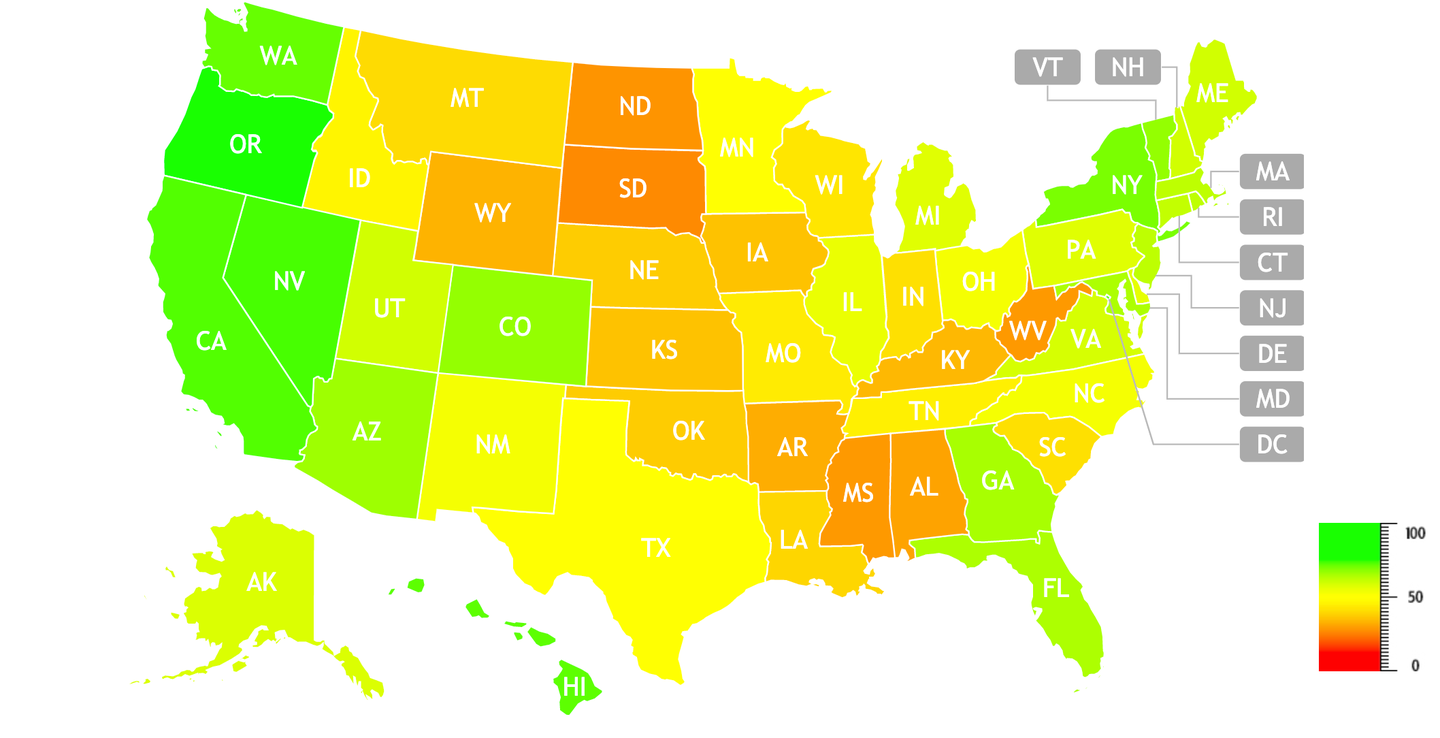
The Number of Americans Eating Plant-Based Has Passed 9.7 Million
- Over 9.7 Million Americans follow "plant-based diets," up from 290,000 back n 2004. This growth outpaces the growth of people identifying as "vegan."
- Based on data from retail traffic, Ipsos Retail Performance, a UK based consumer insights company, has generated a state-by-state map that shows the rise in popularity of plant-based diets.
- Oregon is the state expressing the most interest in vegan diets, consistently achieving the highest score in 12 out of 15 years, whereas Mississippi was found to be the state least interested in plant-based diets.
How Vegan is Your State? Check Out This Time-Stamped Interactive Map
Global retail traffic counting specialist Ipsos Retail Performance has revealed its study into Google search data to demonstrate how interests in plant-based diets have grown over time, depending on the state. This is one way to measure consumer interest, but another is actual sales of plant-based foods, and a third is surveying individuals, which Gallop does regularly.
In those surveys, the number of people who call themselves "vegan" is growing, but slowly, and African Americans are the fastest-growing demographic of vegan eaters in the US. Meanwhile, Canadians are now the fastest-growing population of people going plant-based for the sake of the environment.
Illustrated through an interactive timeline and map charting search data between 2004-2019, findings include:
For the interactive map of how your state stacks up check this link.
- The most consistently ‘vegan’ state is Oregon, achieving the highest search value for 12 years out of 15. This is followed by Vermont, Washington and California.
- The state which is most reluctant to seek out vegan trends (i.e. the biggest meat-eaters) is Mississippi, followed by South Dakota, Alabama and North Dakota.
- Political leanings correlate with how vegan each state is, with the top 10 biggest vegan states all largely voting Democratic, and the 10 lowest vegan states largely voting Republican.
- The states seeing the biggest change in attitudes include Nevada (showing a 38 point increase in vegan searches) and New Hampshire (with a 31 point decrease in vegan searches).
The preference for plant-based alternatives to meat and other animal products has exploded in popularity over the past decade, with over 9.7 million Americans now seeking plant-based foods in their searches.
The interactive map shows the US plant-based hotspots and those states that remain a little resistant to seeking out plant-based options through their online searches.
Throughout the period covered in the research, the North Eastern and West Coast states showed the earliest interest in plant-based foods. More states followed suit in 2013, where there was a significant increase in interest-driven by high profile awareness driven by celebrities and the wide range of new meat alternatives showing up in stores and restaurants.
Commenting on the map, Kelly Fairchild, who is the global business development manager from Ipsos Retail Performance said: “Plant-based diets are fast becoming mainstream, but the change hasn’t been a steady one. Recent years have seen rapid adoption of vegan diets and more meat-free products making their way onto shelves.
“As the dialogue around veganism shifts from one of animal welfare, to wider concerns around climate change and personal health, we are seeing more and more people adopt this once minority dietary preference."
Editor's Note: The Beet believes that the growth in searches for vegan and plant-based products is a positive step but that it's important to see the difference between the mainstreaming of plant-based eating and interest from the specific term vegan or veganism.
For the number of people who define themselves as vegan or vegetarian, see this story from Gallop. The number of people who say they are vegan grew from 2 percent to 3 percent in the most recent poll. The entire methodology of how the retail info was counted can be found here.
Even as the number of vegetarians and vegans has not grown significantly, sales of plant-based foods are exploding. In 2017, sales of plant-based food grew 8.1% and topped $3.1 billion last year.
Meanwhile, plant-based alternatives to dairy products are soon expected to account for 40% of the total sales of dairy beverages. Increased sales of plant-based foods, without a corresponding increase in the percentage of Americans who say they are vegan or vegetarian, likely indicates a greater overall interest in these products.
Based on the growth of consumer interest, the new products hitting the market and Gallup's latest findings on vegetarianism and veganism, it appears Americans are eager to include alternatives to animal products in their diets but are not willing to call themselves vegan or give up eating all fish, poultry, dairy or meat completely. The Beet welcomes the trend and is here to make plant-based eating easier, more delicious and more doable, every single bite.
More From The Beet






